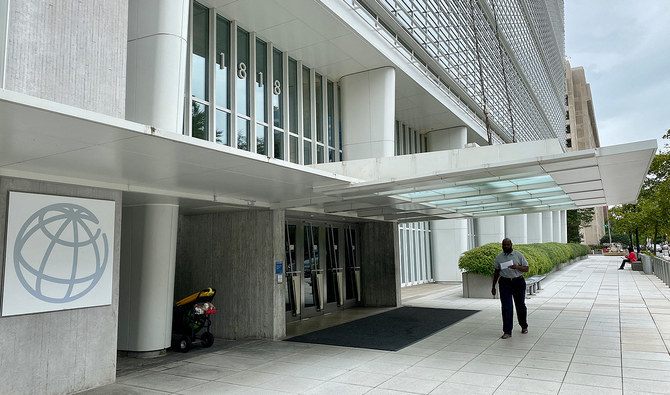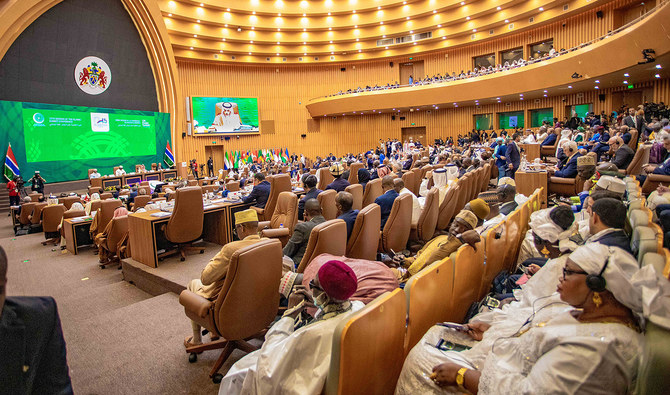KARACHI: The World Bank has linked the approval of a $450 million loan for Pakistan with the completion of the ongoing ninth review of the international monetary fund’s $6.7 billion bailout program, the global lender has said.
The second Resilient Institution for Sustainable Economy (RISE-II) is a policy loan for budgetary support for which the government of Pakistan is expected to receive $450 million from the World Bank. The program was expected to be approved in 2021 but has been delayed.
Nearly 100 days have passed since the last IMF staff level mission to Pakistan and the two sides have yet to strike a preliminary deal - a key step to secure the next funding tranche of a bailout deal signed in 2019. That is the longest such gap since at least 2008.
Meanwhile foreign exchange reserves at $4.457 billion cover barely a month's worth of imports.
A World Bank spokesperson told Arab News this week that considerable progress had been made and the RISE program would now be linked to the completion of the country’s ongoing IMF review.
“The World Bank continues to work with the Government of Pakistan on the preparation of the RISE-II Development Policy Operation, including discussions around supported policy actions on which there has been considerable progress recently; the adequacy of the macroeconomic framework; the financing amount; and the timeline for approval, in particular, as it relates to the completion of the ongoing IMF review,” WB spokesperson Mariam Altaf said in an emailed response to Arab News.
The global lender had approved $500 million in financing under the RISE-I program for Pakistan to mitigate the impacts of the COVID-19 pandemic, while RISE-II was approved in 2020 to help Pakistan strengthen its fiscal management, promote transparency, increase private sector growth, and undertake foundational reforms in the energy sector to transition to low-carbon energy.
RISE-II also supports foundational reforms to improve the financial viability of the power sector through a reduction and ultimate elimination of the sector’s circular debt, which was initiated under RISE-I.
It further aims to improve the investment climate through the implementation of a nationwide harmonized General Sales Tax (GST), a competitive national tariff policy, an inclusive digital payments system that allows fintech companies to undertake electronic money operations, and a better-regulated banking system, according to a World Bank document.
The South Asian nation is currently negotiating with the IMF for the conclusion of the ongoing review ahead of the fiscal budget for the next year, expected in the first week of June 2023.
The talks between the Fund and Pakistani authorities are ongoing since November 2022 but no progress is in sight yet, as the IMF calls for more prior actions despite an energy tariff hike, the presentation of a mini budget, and the arrangement of additional financing from friendly countries like China, Saudi Arabia and the UAE.
The deadlock has blocked funding not only from IMF but also from other multilateral and bilateral lenders, including the World Bank. The conclusion of the ongoing review will clear the way for the disbursement of $1.1 billion from the Fund and unleash other bilateral and multilateral financing.
Nathan Porter, mission chief to Pakistan at the IMF, last week said the lender was working with the Pakistani authorities to bring the ninth review to a conclusion once the necessary financing was in place and the agreement was finalized.
“In addition, the IMF supports the authorities in the implementation of policies in the period ahead, including in the technical work to prepare the FY24 budget, which is to be passed by the National Assembly before end-June,” he said in a statement shared with Arab News.
In recent negotiations between Pakistan and the IMF, the fuel subsidy scheme announced by Prime Minister Shehbaz Sharif in March 2023 has been a sticking point but after prolonged discussions, Pakistani authorities have finally given up the subsidy, which envisaged charging the country’s rich and subsidizing the poor to mitigate the impacts of high inflation that hit 36.4% in April this year.
Pakistani authorities have also committed that they will not introduce new tax exemptions and
durably allow a market-based exchange rate for the rupee, according to the report.
The country’s national currency on Thursday breached the psychological barrier of Rs300 against the United State dollar in the interbank market before closing at Rs298.93.
Pakistani analysts believe the recent rupee devaluation against the greenback, among other factors, is the outcome of the government’s assurance of a market-determined exchange rate to the IMF.
“There are three factors that contribute to the rupee depreciation,” Tahir Abbas, the head of research at Arif Habib Limited, told Arab News. “Political instability, market-based exchange rate implementation, and the demand for import payments are the key factors that impact the rupee against the dollar.”
The Pakistani rupee has depreciated by 24.25% so far since January 2023 and by 31.47% since July 2022.
















